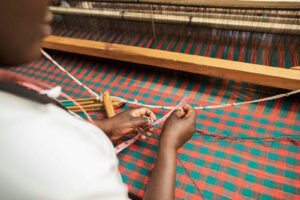In today’s world, where sustainability and ethical practices are becoming increasingly important, the concept of ethical luxury lifestyle is gaining traction. It combines the allure of luxury with a commitment to eco-consciousness, promoting sustainable elegance and green living without sacrificing style. This blog post explores 10 actionable habits for integrating ethical practices into your luxurious lifestyle, highlighting the significance of choices like supporting sustainable luxury fashion brands, opting for eco-friendly materials, and embracing slow fashion.
1. Choose Sustainable Luxury Fashion Brands
When it comes to embodying an ethical luxury lifestyle, the brands you choose make a significant impact. Opting for sustainable luxury fashion brands such as Stella McCartney and others that prioritize ethical practices ensures you’re supporting environmentally responsible and socially conscious initiatives. These brands often lead the way in sustainable fashion, using organic cotton and recycled materials to minimize environmental impact while maintaining high standards of quality and style.
2. Opt for Sustainable Materials
Sustainable materials are at the core of ethical luxury fashion. From organic cotton and recycled fabrics to innovative materials like recycled nylon, these choices help reduce the fashion industry’s carbon footprint. By selecting garments made from sustainable materials, you contribute to a more sustainable fashion industry that values environmental responsibility without compromising on luxury and aesthetic appeal.
3. Embrace Slow Fashion
In contrast to fast fashion, which promotes rapid turnover and mass consumption, slow fashion encourages thoughtful purchasing decisions and emphasizes durability and timeless style. Embracing slow fashion means investing in high-quality pieces that are ethically produced, thus supporting fair labor practices and reducing waste. This approach not only enhances your wardrobe with enduring elegance but also supports a more sustainable fashion industry overall.
4. Support Local and Artisan Communities
Empowering local and artisan communities is another cornerstone of ethical luxury living. Many luxury brands collaborate with artisans worldwide, ensuring fair wages and preserving traditional craftsmanship. By supporting these initiatives, you contribute to community development and cultural sustainability, fostering a deeper connection between fashion consumption and social responsibility.
5. Promote Supply Chain Transparency
Transparent supply chains are essential for ethical luxury brands. They ensure accountability throughout the production process, from sourcing raw materials to manufacturing and distribution. Brands that promote supply chain transparency prioritize fair labor practices and environmental sustainability, providing consumers with the information needed to make informed choices about their purchases.
6. Reduce Environmental Impact
Reducing environmental impact is a critical aspect of ethical luxury living. By opting for sustainable sourcing and production methods, luxury brands can minimize their carbon footprint and conserve natural resources. Choosing products that adhere to these principles not only supports environmental sustainability but also sets a precedent for more sustainable practices within the luxury fashion industry.
7. Advocate for Ethical Considerations
Ethical considerations should be integrated into every stage of the fashion industry. From design to manufacturing processes, ethical practices ensure that garments are produced with respect for both people and the planet. Brands that prioritize ethical considerations contribute to a fashion revolution that values transparency, fair treatment, and environmental responsibility.
8. Recycle and Upcycle
Recycling and upcycling luxury fashion items play a crucial role in promoting a circular economy. By giving new life to pre-loved garments or repurposing materials, you reduce waste and support sustainable consumption habits. Luxury brands increasingly incorporate recycled materials and offer upcycling services, encouraging consumers to participate in conservation efforts while maintaining a stylish wardrobe.
9. Educate Yourself and Others
Education is key to fostering a more sustainable fashion industry. Understanding the impact of luxury consumption and the benefits of ethical practices empowers consumers to make conscientious choices. By educating yourself and spreading awareness, you contribute to a fashion industry that prioritizes social responsibility, environmental sustainability, and fair labor practices.
10. Balance Style with Ethics
Achieving a balance between style and ethics is achievable in today’s luxury market. Many contemporary styles and designer brands embrace ethical practices without sacrificing aesthetic appeal. By prioritizing high-quality materials, sharp tailoring, and sustainable production methods, you can build a wardrobe that reflects your personal style while aligning with your values of ethical luxury living.
The Rise of Ethical Luxury
The concept of ethical luxury represents a significant shift in consumer values within the luxury fashion industry. Traditionally associated with exclusivity and opulence, luxury brands are now increasingly expected to demonstrate environmental responsibility and ethical practices. This shift is driven by a growing awareness of sustainability issues, climate change, and social justice concerns among consumers worldwide.
Luxury brands that embrace ethical practices not only cater to a conscientious consumer base but also position themselves as leaders in a more sustainable fashion industry. This evolution reflects a broader movement towards transparency, accountability, and a commitment to minimizing the industry’s environmental and social impact.
Impact of Ethical Luxury on the Fashion Industry
The adoption of ethical practices in luxury fashion has a profound impact on the industry as a whole. Beyond individual brands, this shift influences manufacturing processes, supply chain management, and consumer behavior. It encourages a reevaluation of production methods, promoting sustainable sourcing, reduced waste, and fair labor practices.
Moreover, the influence of ethical luxury extends beyond environmental and social considerations to encompass economic sustainability. By supporting local communities and artisanal craftsmanship, luxury brands contribute to cultural preservation and economic empowerment. This holistic approach fosters a more resilient and inclusive fashion ecosystem.
Wrapping Up: Ethical Luxury Lifestyle
In conclusion, adopting an ethical luxury lifestyle involves more than just purchasing high-end clothing—it’s about making informed choices that prioritize sustainability, ethical practices, and social responsibility. By implementing the 10 eco-conscious habits discussed in this blog post, you can contribute to a more sustainable fashion industry while enjoying the elegance and allure of luxury living. Together, we can shape a future where ethical considerations are at the forefront of the luxury fashion industry, promoting a harmonious balance between style and sustainability.
Other suggested articles:
Exploring Iconic Luxury Fashion Brands for Women: A Must-Read Guide



